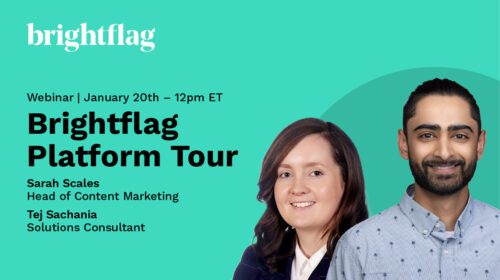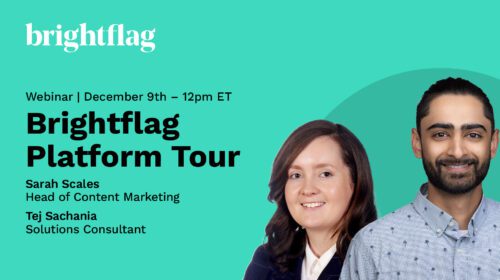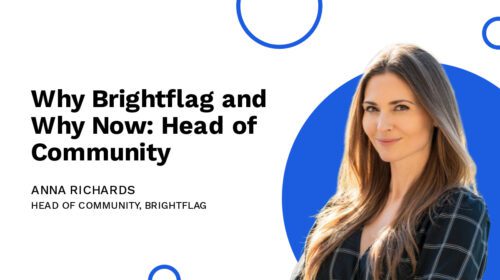Key Takeaways from CLOC Global Institute 2025
Each year, the focus of CLOC Global Institute (CGI) shifts to reflect the latest changes in the legal operations landscape. For the 2025 event, that meant an increase in the amount of programming centered around AI’s growing role within in-house legal departments, as well insights into how best to navigate legal ops career growth as the function matures.
As Chief Customer Officer at Brightflag, I’ve been afforded a unique perspective on CGI. The hundreds of interactions I have with in-house professionals every year—and my desire to always stay apprised of the challenges they’re currently facing—has granted me greater insight into how well the themes of each year’s event resonate with the legal ops community.
With that in mind, here were my five key takeaways from CLOC Global Institute 2025 that I think highlight broader trends within the industry, and how future attendees can make the most of the event.
1. “Your career is a jungle gym, not a ladder.”
This David Cowen quote will ring true for anyone who has spoken to a large enough subset of legal operations professionals. Because unlike law firm or finance roles that map neatly onto hierarchical ladders, legal ops career paths are often full of lateral moves, cross-functional pivots, and unexpected opportunities.
This was a recurring theme at CLOC Global Institute 2025—including at the panel discussion I spoke on with Akshay Verma (SpotDraft) and Christine Kennedy (Major, Lindsey & Africa). Few people in the legal operations field come from a background of practicing law. For every former attorney who transitioned into legal ops, there are many others who found their way to the role after working in finance or business consulting, or as a paralegal, or serving as a project manager.
So what’s the common thread among legal operations professionals, given how diverse their backgrounds tend to be? Agility. Growth in this field is less about climbing to a prescribed title and more about collecting diverse experiences that expand your influence and capabilities. As legal departments increasingly become strategic hubs within the business, those who bring a multidimensional toolkit to the table will stand out.
2. Your ability to successfully use AI will make or break your career.
AI is no longer a buzzword; it’s a business-critical competency.
Every legal team I spoke with was either actively deploying AI tools or in the midst of finalizing their AI roadmap.
But here’s the nuance: success doesn’t come from using AI for the sake of it. It comes from applying AI in ways that solve real, persistent pain points—automating invoice review, optimizing matter management, surfacing budget insights, or streamlining contract workflows.
For legal ops professionals, this means more than just being tech-aware—it means becoming tech-fluent. If you can champion meaningful AI adoption, connect it to outcomes, and communicate its value across the business, you’ll not only amplify your team’s impact—you’ll accelerate your own career trajectory.

3. Plans are useless, but planning is indispensable.
This idea surfaced in multiple sessions, and it couldn’t be more relevant in legal operations. The sheer volume of change legal teams are contending with—whether in terms of regulations, technology, or business needs—means static plans rarely survive contact with reality.
But that doesn’t mean planning isn’t essential. On the contrary, it’s our most important tool for staying proactive.
Whether it’s building flexible budget scenarios, pressure-testing resourcing models, or setting benchmarks for vendor performance, legal ops teams that invest in planning are better equipped to adapt without chaos. At Brightflag, we see this play out daily in how our customers use data to course-correct before problems arise.
The lesson is this: don’t cling to the plan—cling to the process of planning. That’s what builds resilience.
4. Vendors value directness. We appreciate a clear “no” if that’s the answer.
Honesty and trust underpin all of our customer relationships at Brightflag. After all, the best partnerships are built not just on shared goals, but on mutual respect—and that starts with honest communication.
That’s why we deeply value when people are direct with us about their needs, concerns, or limitations. A clear “no” is far more useful than a protracted “maybe,” because it gives us clarity, saves everyone time, and often opens the door for more direct communication further down the road.
If you’re evaluating a product and it’s not the right fit—say so. If your priorities have shifted—let your vendors know. Brightflag is in this space because we care deeply about helping legal teams succeed. Clear communication is the cornerstone of that success.
5. CLOC is a work event. The people who treat it as such get the most out of it.
With Las Vegas as the backdrop—and so many social events scheduled around the conference itself—it’s easy to fully immerse yourself in the fun of being at CLOC. But the professionals who come prepared—who treat each session, meeting, and social interaction as an opportunity to learn or advance their professional goals—are the ones who leave with the biggest return on their investment.
Every year, I see attendees who schedule meetings with vendors, take notes during sessions, and debrief with their teams each evening. They treat the event like the strategic work week it is. And it pays off in the form of new ideas, better vendor relationships, and deeper peer connections.
If you’re making the time and effort to attend CLOC, make the most of it. Come with questions. Follow up with speakers. Introduce yourself to someone new. The future of legal operations is being built in rooms like these.
Final Thoughts
CLOC Global Institute 2025 reinforced something I’ve believed for a long time: legal operations is one of the most dynamic, impactful, and people-driven functions in business. It’s where innovation meets execution, where technology meets human insight.
I’m grateful to everyone I connected with this year—Brightflag customers, industry peers, and new faces alike. The future of legal ops is bright, and I’m excited to continue building it together.
If anything from this reflection resonates with you, I’d love to keep the conversation going. Let’s talk about where you’re headed—and how Brightflag can help you get there.



